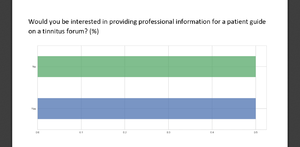The TRI 2018 conference was held in Germany earlier this year. You can find more about the conference, including @Steve's conference report here.
After the conference, we created a survey in collaboration with TRI to investigate the attendees' experiences, so that future TRI conferences can further be improved. The survey also asked a few unrelated questions relating to our work.
The results have now been analyzed by Kushal Agrawal, one of the ESIT students. In total we received 83 completed responses from the 300+ attendees. Over 40% of the respondents reported having tinnitus.
I have attached the PDF. I had to remove the open-ended answers because there might be some data protection issues with publishing those. Otherwise the attached report is complete.
After the conference, we created a survey in collaboration with TRI to investigate the attendees' experiences, so that future TRI conferences can further be improved. The survey also asked a few unrelated questions relating to our work.
The results have now been analyzed by Kushal Agrawal, one of the ESIT students. In total we received 83 completed responses from the 300+ attendees. Over 40% of the respondents reported having tinnitus.
I have attached the PDF. I had to remove the open-ended answers because there might be some data protection issues with publishing those. Otherwise the attached report is complete.

 Founder
Founder Member
Member
